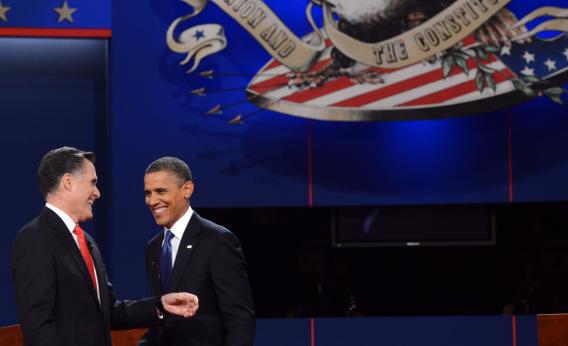Barack Obama’s timid approach to debating—I saw a lot of analogies to a prevent defense in football, but I think it was more like the four corners basketball offense that’s so deadly boring it’s now against the rules—was the most striking element of tonight’s debate, but the most important one is probably that Mitt Romney finally shook the Etch a Sketch tonight and moved to the center.
With the spotlight on and the pressure in place to define his tax plan, Romney angrily denied the existence of any agenda to reduce federal revenue and conceded that political realities mean he may not be able to cut rates by very much consistent with that agenda. Romney swore to defend single-payer health care for everyone born in 1957 or earlier, touted the universal health care initiative he signed in Massachusetts, promised not to cut federal education spending, defended the role of regulation in building an effective market economy, defended the current structure of Social Security, and charged Obama with failure to crack down adequately on big banks.
The problem with all of this is exactly what you’d expect the problem to be with an Etch a Sketch move—it’s inconsistent with things he’s committed himself to previously.
You can’t implement the budget roadmap that Paul Ryan wrote and Mitt Romney endorsed without slashing education spending or gutting federal regulatory agencies. Romney’s promised to repeal Obama’s efforts to bring Massachusetts-style health care nationwide. In the primaries, Romney ran as a bold tax cutter not a “maybe I’ll tinker with the rates if congress wants to” squish. Ryan authored a plan to privatize Social Security and Romney has endorsed similar ideas both in 2004 and in his 2010 book. Romney’s been caught on video angrily ranting to financial backers about 47 percent of Americans being moochers and looters, and staged his entire nominating convention as a paen to business owners rather than ordinary people.
Obama wasn’t very good at pointing this out tonight. And Romney is nothing if not good at remaking his persona. To be ideologically plastic enough to win a general election in Massachusetts in 2002 and a GOP presidential primary in 2012 is tough. Romney was helped in this by the fact that there was a three-way conspiracy to define “domestic issues” as very narrowly equivalent to tax and budget issues. There was no real talk of the environment, of LGBT equality, of labor unions, of monetary policy, of the regulatory state outside of Dodd-Frank, of immigration, of family life or women’s role in the workforce or any of a host of other issues where it’s difficult to paper over ideological voids. But on the issues they did talk about, Romney succeeded in portraying himself as someone who’s considerably less conservative than John Boehner, Mitch McConnell, or the Mitt Romney who we’ve seen a lot of over the past 18 months. Whether you believe that’s the Mitt Romney who’d show up in the White House in 2013 if he wins in November is a separate question, but the guy we saw tonight is a much more appealing figure than the guy who was on the trail all summer.
